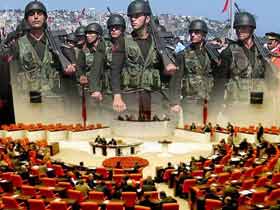The Turkish Armed Forces legend is shattered, everybody is astonished ...
(...)
The Turkish Armed Forces had built up an image domestically and internationally.
An almost legendary show of force was in question.
A much disciplined Turkish Army was always mentioned, full of heroic epics, the stories of sacrifices and successes of which we were constantly exposed to.
The Turkish Armed Forces had built up an image domestically and internationally.
An almost legendary show of force was in question.
A much disciplined Turkish Army was always mentioned, full of heroic epics, the stories of sacrifices and successes of which we were constantly exposed to.
(...)
Where are our heroes?
Where are the Southeast commanders who constantly appear on TVs, who write books and put on airs, who slam civilians?
It means that we have only been given an image.
An empty image.
(...)
At the root of the problems in the TSK lies the facts that commanders were involved in the nation’s politics rather than their real jobs and that they spent the majority of their time dealing with domestic politics.
The TSK legend is shattered, everybody is astonished
Tuesday, September 6, 2011
MEHMET ALİ BİRAND
www. hurriyet dailynews. com
Former Chief of General Staff Gen. Işık Koşaner’s famous conversation posted in the Internet has astonished not only us but also the international military community.
The Turkish Armed Forces, or TSK, had built up an image domestically and internationally. An almost legendary show of force was in question. A much disciplined Turkish Army was always mentioned, full of heroic epics, the stories of sacrifices and successes of which we were constantly exposed to.
Koşaner’s speech has shattered this legend. Where is our army, the apple of our eye? What happened to our heroic army that would make our eyes water when, in parades, they would pass with their spotless uniforms? What happened to that army which was the insurance of all we own, defender of our democracy, assurance of our lives, that army we cherished?
We are in deep disappointment.
We are not alone in this; the international military community is making new assessments and writing new reports about the TSK.
It seems that whatever has been told to us up until today were not at all correct.
- They used to say it was NATO’s and the region’s most powerful army.
It seems that we have created hundreds of thousands of Mehmetçiks (soldiers) ready to die in the name of “love for the country – mission for the nation.” We have assigned them, beyond dying, even to do house chores.
- They used to say it was the most disciplined army.
It seems that, in time, there was no discipline left. An unnecessary rudeness, extreme arrogance and a fancy to act superior to rule of law have become widespread.
- People said its training programs were better than the US army’s
It seems that no proper training was provided and no effective command and control practice was developed.
Look at what Gen. Koşaner is explaining.
He goes on a tirade on the troubles in the management of troops, on those who cannot properly process the data received from unmanned air vehicles, the idleness and mayhem in the barracks and those officers who cannot lead their soldiers.
- They used to say the TSK’s biggest chance was the experience it gained in anti-terror combat
It seems that, let alone experience, in anti-terror combat there was no shiny lesson learned except for about personal sacrifice. One listens to stories of those commanders who left their weapons and fled or who have shot their own soldier.
Where are our heroes?
Where are the Southeast commanders who constantly appear on TVs, who write books and put on airs, who slam civilians?
It means that we have only been given an image.
An empty image.
Then, and only then, can you understand that you have been deceived.
At the root of the problems in the TSK lies the facts that commanders were involved in the nation’s politics rather than their real jobs and that they spent the majority of their time dealing with domestic politics.
Especially the General Staff, since the coup on May 27, 1960, played an accelerating role in domestic politics.
Take a look at our recent history, you will notice it immediately.
The March 12, 1971 intervention and Sept. 12, 1980 coup have resulted in the TSK spending 25 years in domestic politics. After that came Feb. 28 and things got even more complicated. The “fine-tuning” attempts for democracy, and if you add to that the military interferences after the Justice and Development Party, or AK Parti, seized power in the 2004-2007 period and especially during the process of the election for Çankaya, you come to the conclusion that the TSK has not released itself from politics for 40 years.
If the senior staff of an army is involved in domestic politics to this extent and if commanders spend most of their time in extra-military affairs, then the situation they have fallen into today becomes inevitable.
You see, I have been drawing attention to this risk for 40 years. For 40 years, I have been writing that the TSK should stay out of politics. Because of that, I have been declared an “enemy of the army.” I was taken to court; they wanted to punish me.
In the end, I was proven right.


